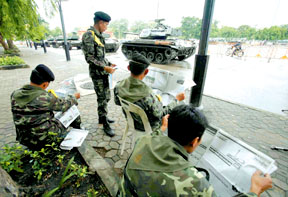|
dailynews |
|
|
|
|
|
OTHER LINKS |

|

|

|
Thailand as a foil for Nepal
In Nepal it was a question of politically - conscious sections of the public, led by the Nepali Congress and the Maoist rebels, rising against a near dictatorial monarch in an effort to shift the balance of power in favour of the Nepalese people. A new democratic constitution is reportedly being crafted for Nepal and only time would tell whether a true democratization of the Nepalese polity would take place.
In Thailand, on the other hand, it has virtually been a case of the monarchy "striking back". The military takeover of power in Thailand is having the full blessings of the Thai monarch and the country's constitution has proved an early, major casualty in the power grab. Right now, the constitution of Thailand has been suspended by the military-monarchy combination and an anti-corruption drive, targeting the former ruling elite, is reportedly under way, with no clear time-table of a return to democratic rule having been announced so far by the Thai power-wielders. Accordingly, Thailand is shaping-up as a foil for Nepal and the Thai people are apparently figuring very little in the ground-breaking political developments in their country. It is this aspect of the non-participation of the Thai public in the political events of their country, together with the prominent role being played by the military-monarchy duo in shaping Thai political developments, which gives to the current state of affairs in Thailand, a strong anti-democratic flavour. A striking contrast, indeed, to Nepal and its grounds well of popular protests. Quite rightly, the democratic world has revolted with rage to the happenings in Thailand. This is virtually a question of Thailand going way back in time in terms of democratic development. Thailand is, of course, no stranger to military rule but the political observer could not be faulted for looking forward to and favouring expanding multi-party representative governance in Thailand with the popularly elected political leaders of the country being increasingly answerable to parliament and other public institutions formed by the democratic process. If at all any crackdowns against corruption in high public places are to take place, they should have their origins in these popular participatory institutions which are in turn answerable to the Thai people. What is happening instead are crackdowns on corruption from "above"; from political institutions which are by no means democratic in nature and are in no way answerable directly to the Thai people; namely the military and the monarchy. The Thai case should, perhaps, be regarded as an eye-opener by other democracies in this part of the world and in particularly the Third World. Ruling and power elites need to be compelled to be increasingly accountable to legislatures and public institutions which are in turn answerable to the people on problems such as power abuse and the accumulation of disproportionate wealth and income far in excess of declared, official earnings. Such stipulations and provisions need to be firmly entrenched in democratic constitutions. If former Thai Premier Thaksin Sinawatra and his fellow politicians and power wielders are accused of amassing wealth by improper means and other irregularities, they must be held accountable and tried by public institutions and courts that are accountable to the State and the people. This is the democratic way to deal with public personalities confronting allegations of the kind faced by Sinawatra and his associates. The Thai situation also reminds us that economic liberalization need not necessarily go along with political liberalization. In terms of economic and material advancement, Thailand is a bright star in the ASEAN firmament. In fact in days past it was classed as one of Asia's "Leaping Tigers" - so dynamic has been its economic growth over the years. However, the current political crisis in Thailand proves that political liberalization has not kept abreast of economic liberalization. The monarchy-backed military coup establishes the need for stronger and publicly accountable democratic institutions in Thailand. These weaknesses enable the older power elites to continue to mould political developments in Thailand. Hence the shortfall in political liberalization. |
![[Global Scrutiny]](Global%20Scrutiny.jpg) REVERSE: A Nepal in reverse. To a degree, the current political
turbulence in Thailand answers to this description.
REVERSE: A Nepal in reverse. To a degree, the current political
turbulence in Thailand answers to this description. 








